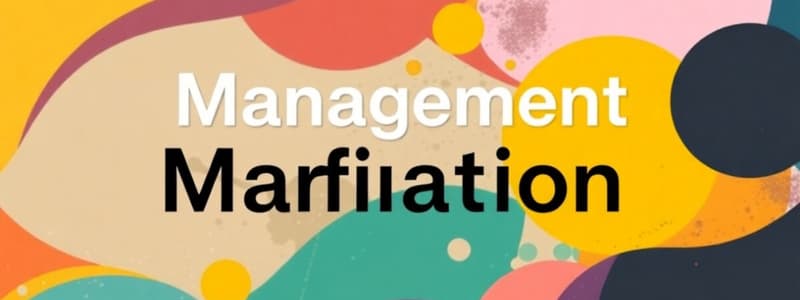Podcast
Questions and Answers
Which management orientation emphasizes human relationships and development?
Which management orientation emphasizes human relationships and development?
- Productivity-Oriented
- Goal-Oriented
- Process-Oriented
- People-Oriented (correct)
What is NOT considered a function of management?
What is NOT considered a function of management?
- Leading
- Investing (correct)
- Planning
- Recruiting
What level of management is primarily responsible for implementing plans and supervising lower-level managers?
What level of management is primarily responsible for implementing plans and supervising lower-level managers?
- Middle Management (correct)
- Lower Management
- Functional Management
- Top Management
Which managerial role involves acting as a spokesperson for the organization?
Which managerial role involves acting as a spokesperson for the organization?
Which skill is characterized by the ability to understand, cooperate with, and motivate others?
Which skill is characterized by the ability to understand, cooperate with, and motivate others?
What is primarily emphasized in the productivity-oriented definition of management?
What is primarily emphasized in the productivity-oriented definition of management?
In which area of management would you likely find specialization in finance and marketing?
In which area of management would you likely find specialization in finance and marketing?
Which of the following is NOT a component of the management process?
Which of the following is NOT a component of the management process?
Flashcards are hidden until you start studying
Study Notes
Definitions of Management
- Productivity-oriented management stresses efficiency and maximizing output.
- People-oriented management values human relationships and individual development.
- Goal-oriented management is centered on achieving organizational objectives through teamwork.
- Process-oriented management emphasizes the essential functions: planning, organizing, leading, and controlling.
- Leadership-oriented management equates to decision-making authority and guiding teams.
The Meaning of Management
- As a noun, it refers to individuals engaged in managerial tasks.
- Management encompasses the processes of planning, organizing, leading, and controlling.
- It is a discipline involving concepts, theories, and practical applications for effective management.
- Viewed as an economic resource, management is one of the critical factors in production alongside land, labor, and capital.
Areas of Management
- General management pertains to overseeing the entire organization, typical in smaller businesses.
- Functional management specializes in specific disciplines such as production, finance, marketing, and personnel, common in larger companies.
Management Functions
- Planning involves creating forecasts, setting objectives, formulating policies, and devising strategies.
- Organizing entails designing the organizational structure, assigning tasks, and delegating authority.
- Leading focuses on motivating, directing, and guiding employees towards goals.
- Controlling includes tracking performance, comparing outcomes to standards, and implementing corrective measures.
- Staffing consists of recruiting, selecting, training, and compensating personnel.
- Representation involves acting as an ambassador for the organization in engagements with stakeholders.
- Innovation is crucial for developing new products, services, or methodologies.
Levels of Management
- Top management defines overarching goals, strategies, and policies for the organization.
- Middle management is responsible for executing plans and overseeing lower-level managers.
- Lower/supervisory management handles daily operations, supervises employees, and reports to middle management.
Managerial Roles (Mintzberg)
- Interpersonal roles include acting as a figurehead, leader, and liaison to facilitate relationships.
- Informational roles involve monitoring information, disseminating it, and acting as a spokesperson.
- Decisional roles encompass being an entrepreneur, handling disturbances, allocating resources, and negotiating.
Management Skills
- Technical skills refer to expertise in specific tools and methods relevant to the industry.
- Human skills involve understanding and collaborating with others effectively.
- Conceptual skills allow one to view the organization holistically and grasp interdependencies.
- Interpersonal skills are vital for inspiring and maintaining rapport with team members.
- Communication skills include proficient verbal and written interactions.
- Time-management skills help prioritize tasks and avoid procrastination through effective delegation.
- Decision-making skills are essential for making sound and timely choices.
Organizational Performance
- Effectiveness measures the extent to which an organization fulfills its mission and delivers customer value.
- Efficiency reflects maximizing output relative to the available resources.
- High-performance organizations pursue both efficiency and effectiveness to excel in the market.
Studying That Suits You
Use AI to generate personalized quizzes and flashcards to suit your learning preferences.




